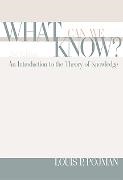Read more
List of contents
Preface.
1. What Can We Know?
2. The Skeptical Tradition.
3. Modern Skepticism.
4. Perception: Our Knowledge of the External World.
5. What is Knowledge? An Analysis.
6. Theories of Justification (I): Foundationalism.
7. Theories of Justification (II): Coherentism and Modest Foundationalism.
8. Theories of Justification (III): Internalism and Externalism.
9. The New Externalism: The Theory of Warrant and Proper Function.
10. Naturalized Epistemology.
11. Virtue Epistemology.
12. A Priori Knowledge.
13. Memory.
14. Other Minds.
15. The Nature of Belief.
16. Belief and Will.
17. The Ethics of Belief.
18. Belief and Acceptance.
19. Epistemology and Religious Belief.
Glossary.
Index.
About the author
Louis P. Pojman (1935-2005) was Professor of Philosophy, Emeritus, at the United States Military Academy and a Life Member of Clare Hall, Cambridge University. He received an M.A. and Ph.D. from Union Theological Seminary/Columbia University. He was a Fulbright Fellow at the University of Copenhagen and a Rockefeller Fellow at Hamburg University. He received his D.Phil. in Philosophy from Oxford University in 1997.His first position was at the University of Notre Dame, after which he taught at the University of Texas at Dallas. Later, at the University of Mississippi, he served for three years as Chair of the Department of Philosophy and Religion. In 1995, he became Professor of Philosophy at the United States Military Academy at West Point. He most recently was Visiting Professor at Brigham Young University in Utah and Visiting Fellow at Clare Hall, Oxford University. Pojman won several research and teaching awards, including the Burlington Northern Award for Outstanding Teaching and Scholarship (1988) and the Outstanding Scholar/Teacher in the Humanities at the University of Mississippi (1994). He wrote in the areas of philosophy of religion, epistemology, ethics, and political philosophy and authored or edited more than 30 books and 100 articles. Louis Pojman passed away in 2005.
Summary
Compact yet more comprehensive than similar texts, WHAT CAN WE KNOW? analyzes the central topics of truth, justification ranging from skepticism to religious belief. Written in the author's friendly and conversational style without unnecessary jargon, the text makes the subject matter more accessible and inviting to students.

